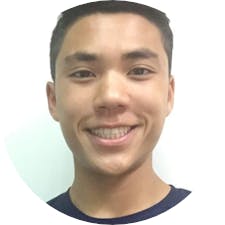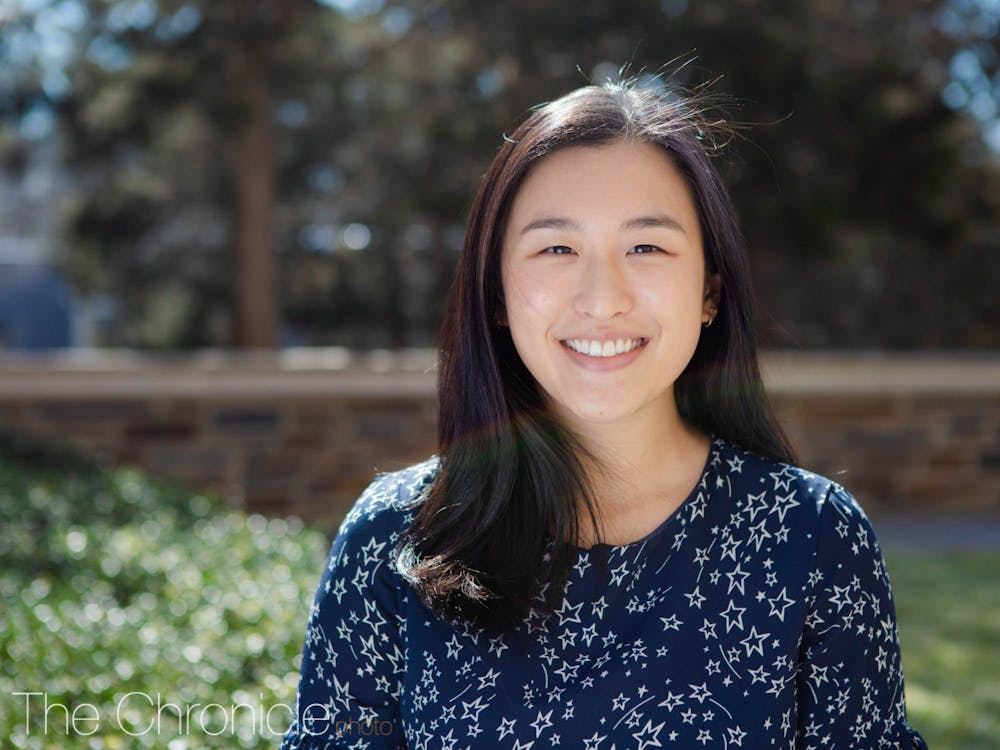Duke Student Government presidential candidate Christina Wang wants to work with administrators and student groups to make Duke more equitable, accessible and student-centered.
“I know there’s a lot of room for Duke to improve in terms of becoming a really equitable space. I’ve seen that being on the [DSG] Equity and Outreach Committee for the past two years,” said Wang, who is currently DSG vice president of equity and outreach. “I have the experience and the relationships built, and the kind of platform set for all these changes that I want to make happen.”
A junior from Phoenix, Wang is studying public policy and psychology. She knows the difficulties that can accompany socioeconomic inequality. Her parents fled China in 1991 with $100 between them, and Wang grew up in predominantly white schools where it was difficult to speak up.
“I’ve really learned to channel a lot of that discomfort into doing work that creates change,” she said.
Though Wang said she was never the student government type in high school, she was inspired to join DSG after hearing the convocation speech from former DSG president Kristina Smith, Trinity ‘19, who encouraged her to join the equity and outreach committee.
During her first two years as a senator on the committee, Wang increased the financial aid offered to pre-orientation participants. She also saw early on the inequities festering beneath the University’s shiny veneer: she witnessed the defacing of the Mary Lou building and went on a listening tour with victims of gender violence.
When Duke moved online, Wang saw how the pandemic exacerbated existing inequities.
“Students of color, first-gen low-income students have been facing a lot of extra pressures and Duke has to step up to meet those,” she said.
Wang helped pioneer the S/U grading policy in spring 2020 and spearheaded the creation of the Student Advocate’s Office, which she described as a “one-stop shop for students to receive peer support on any institutional issue.”
When DSG paused its sessions for the summer, Wang kept working. She drafted the proposal for the official Ombuds office. After seeing how the pandemic disrupted community, Wang also helped establish the Blue Devil Buddies mentorship program.
The three prongs of her platform are geared towards strengthening these past initiatives while also implementing new ones: ensuring greater equity, building a “Duke community for all” and pushing for more student-centered resources.
To foster a more equitable environment, Wang hopes to expand the Student Advocate’s Office to include support for issues related to financial aid, hate and bias, and sexual harassment. She also wants to expand the course cost transparency tool and support the Disability Alliance’s initiatives.
As for strengthening the community, Wang wants to make Blue Devil Buddies a permanent program. Wang is also a member of the Next Generation Living and Learning 2.0 Committee, and she said she wants to ensure that student voices are taken into account as the University transforms residential life. She also hopes to work with Duke Sexual Harassment and Assault Prevention and Education to increase awareness about the persistence of gender violence.
Her third goal is to create more student-centered resources, particularly regarding mental health.
“I think everyone is super aware of ... how people are struggling with mental health right now,” Wang said.
Wang helped 1000 Duke students gain premium access to Headspace, the popular mindfulness and meditation app, as a pilot program. She wants to expand that program to include all interested Duke students.
Even as she campaigns to be president of DSG, Wang is aware of the organization’s pitfalls.
“I know in the past DSG has failed to support student groups. I imagine that it is really, really tiring to listen to a student government that hasn’t in the past been super supportive,” Wang said. “Moving forward, I think DSG really can become a mechanism for student advocacy and lifting up the work that student groups are already doing.”
To reform DSG, Wang would revamp the recruitment process to promote greater diversity among senators, pursue more regular communication with student groups and promote greater transparency about DSG’s work.
Robert Thompson, professor emeritus of psychology and neuroscience, said that he first met Wang when she took his first-year seminar on empathy and identity. He said teaching the seminar allows him to explore what motivates his students.
Get The Chronicle straight to your inbox
Sign up for our weekly newsletter. Cancel at any time.
“Being of service has always been a cardinal aspect of how I’ve known Christina,” Thompson said. “She’s always been passionate about making Duke a more equitable and accessible place.”
He said he has seen Wang work toward this goal through her involvement in Project Build, even before she became a DSG senator.
“She has an idea of how to make Duke a better place and it has to do with more equity and more accessibility. And that's what she cares about, and has been working systematically toward in various ways,” Thompson said.
Sophomore Lily Levin said Wang is a person of her word.
“She doesn’t have empty words or empty talk,” Levin said. “When she says something, you know she’s going to do it … She’s motivated and has all these good ideas, and she does what she says she’s going to do.”
Editor's note: This story has updated to reflect that Wang is DSG vice president of equity and outreach.

Chris Kuo is a Trinity senior and a staff reporter for The Chronicle's 118th volume. He was previously enterprise editor for Volume 117.

